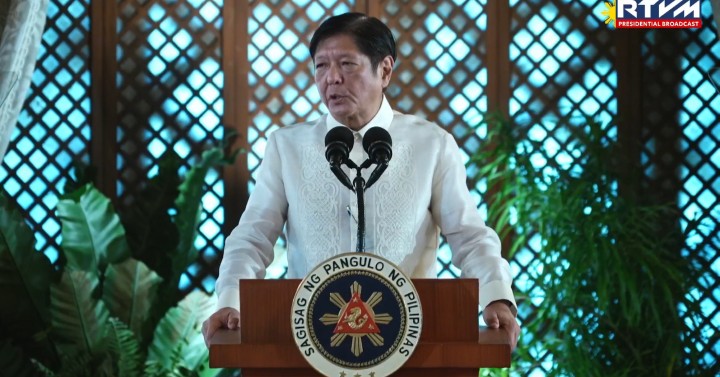Philippines Fights Corruption with Two-Pronged Approach
President Ferdinand R. Marcos Jr. (RTVM Screengrab)
To combat corruption, the Philippines is implementing a strategic two-pronged approach: streamlining government processes through digitalization and encouraging active citizen participation in good governance.
Digitalization: Unveiling Transparency and Efficiency
President Ferdinand R. Marcos Jr. recently highlighted this strategy at the 5th State Conference on the United Nations Convention against Corruption (UNCAC) Implementation and Review held in Malacañang. He underscored the importance of streamlining and digitalizing government processes to minimize corruption opportunities.
The initiative stems from the New Government Procurement Act, which introduces standardized electronic bidding and payment systems. This is being facilitated through the enhanced Philippine Government Electronic Procurement System.
“By streamlining and digitalizing processes, we are not only improving the efficiency of government services, but also fostering trust and accountability between the government and the public,” said Marcos, outlining the benefits.
Empowering the People: A Nation of Informed Citizens
Marcos emphasized the crucial role of citizen participation. He stressed the need to empower Filipinos to contribute to ethical governance and a culture of integrity by encouraging active engagement.
The government is promoting the electronic Freedom of Information platform, a vital tool that allows citizens to access government information, participate in decision-making processes, and hold officials accountable.
“We must shift away from merely enforcing compliance with laws, rules, and regulations,” Marcos declared. “We need to steer our people towards the practice of integrity in their daily lives. Integrity that is rooted in katapatan (honesty), malasakit (care), pakikipag-kapwa (fellowship), and bayanihan (spirit of community) – these need to be reinforced and sustained.”
He further elaborated on the vision: “This is the kind of transformation that we envision, which guides not only our systems of governance but our behaviors as citizens of this Bagong Pilipinas.”
The UNCAC, an international anti-corruption treaty endorsed by over 180 countries, including the Philippines, guides this national commitment.
The conference also highlighted the presentation and implementation of the Integrity Management Plan (IMP), overseen by the Office of the President – Office of the Deputy Executive Secretary for Legal Affairs (OP-ODESLA).
Marcos affirmed the country’s continuous dedication to upholding UNCAC obligations. He described the IMP as a powerful tool to enhance both individual integrity and the integrity of systems across the bureaucracy.
Can you provide examples of concrete platforms or programs being developed to facilitate citizen feedback and reporting on corruption?
## Interview with Presidential Advisor on Anti-Corruption
**Interviewer:** Thank you for joining us today. The Philippines is making headlines with its new two-pronged approach to combatting corruption. Can you tell us more about this strategy?
**Presidential Advisor:** Certainly! President Marcos Jr. recognizes that corruption is a hydra-headed beast that requires a multifaceted attack. Our two-pronged strategy seeks to address this challenge head-on.
**Interviewer:** The President recently highlighted digitalization as a key weapon in this fight. Can you elaborate on that?
**Presidential Advisor:** Absolutely. We believe that by streamlining and digitalizing government processes, we can significantly reduce opportunities for corruption. This initiative is built upon the foundation of the New Government Procurement Act, which mandates standardized electronic bidding and payment systems. This is being implemented through the enhanced Philippine Government Electronic Procurement System. Think of it this way: by bringing transparency and efficiency to government transactions, we make it much harder for corrupt practices to flourish.[[[[[[[[
**Interviewer:** And what about the second prong of the strategy, encouraging citizen participation?
**Presidential Advisor:** That’s equally crucial. We recognize that fighting corruption is not solely the government’s responsibility. We need an engaged and empowered citizenry that actively participates in good governance. This means promoting transparency, accountability, and public awareness.
**Interviewer:** What concrete steps are being taken to encourage citizen participation?
**Presidential Advisor:** We are exploring various avenues, including strengthening whistleblower protection mechanisms, fostering dialog between government agencies and civil society organizations, and utilizing technology to create platforms for citizen feedback and reporting. We believe that when citizens feel empowered to speak up and hold those in power accountable, it creates a powerful deterrent against corruption.
**Interviewer:** This sounds like a comprehensive and ambitious approach.
**Presidential Advisor:** Indeed, it is. President Marcos Jr. is fully committed to tackling this issue head-on. We firmly believe that by combining digital innovation with active citizen engagement, we can make significant strides in the fight against corruption and build a more transparent and accountable Philippines.


